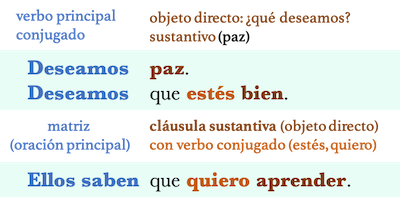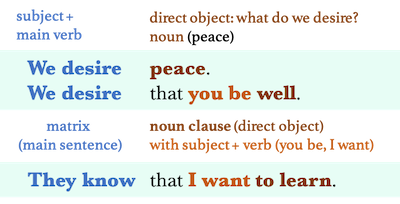54. El subjuntivo en cláusulas nominales / The Subjunctive in Noun Clauses
- Page ID
- 16252
|
Una cláusula nominal o sustantiva es un tipo de oración subordinada (con verbo conjugado) que tiene la misma función que un sustantivo: es el sujeto o el objeto de una oración principal o matriz. Por ejemplo, en la oración: "Entendemos la lección", el sustantivo lección es el objeto del verbo entender. Si decimos "Entendemos que vives aquí", vives aquí es una cláusula sustantiva (funciona como un sustantivo, objeto del verbo entender). Más ejemplos: |
A noun clause is a kind of dependent clause (including subject + verb) which has the same function a noun has: to be the subject or object of a main sentence or matrix. For example, in the sentence "We understand the lesson", the noun lesson is the object of the verb to understand. If we say "We understand you live here", you live here is a noun clause (serves as a noun, object of the verb to understand). More examples: |
 |
 |
DIRE
|
El subjuntivo se usa en cláusulas nominales cuando la matriz expresa duda (incredulidad), influencia (un mandato indirecto, peticiones, deseos sobre algo o alguien), rechazo (negación de algo) o emoción (reacción subjetiva) [DIRÉ]: |
The subjunctive is used in a noun clause when the main verb expresses doubt (disbelief), influence (an indirect command, requests, wishes on something or someone), denial (rejection), or emotion (subjective reactions) [DIRE]: |
| Duda, incredulidad: | No es posible que sea verdad. Dudo/no creo que salga hoy. Es increíble que te vayas ya. |
It's not possible that it may be true. I doubt/don't believe I'll go out today. It's hard to believe you're leaving now. |
| Influencia, deseos: | Sugieren que llames ahora. Exijo que estén presentes. Quiero que seamos felices. |
They suggest that you call now. I demand that they be present. I want us to be happy. |
| Rechazo, negación: | No digo que sea fácil. Es falso que me moleste el ruido. No es cierto que haya problemas. |
I am not saying (that) it is easy. It is false that noise disturbs me. It's not true that there are problems. |
| Emoción, reacción subjetiva: | Me sorprende que Ud. no entienda. Es magnífico que llueva. Estoy feliz de que trabajes aquí. |
It surprises me that you do not understand. It's wonderful that it rains. I am happy (that) you work here. |
| • Con verbos que expresan influencia (deseos) y emoción, se emplea el infinitivo si hay un solo sujeto: Quieren salir. (ellos) Estoy feliz de salir. (yo) Siento molestarte. (yo) PERO: Quieren que salgamos. (dos sujetos: ellos, nosotros) Estoy feliz de que trabajes aquí. (dos sujetos: yo, tú) |
• With verbs expressing influence (wishes) and emotion, use the infinitive if there is only one subject: They want to get out. I'm happy to go out. I'm sorry to disturb you. BUT: They want us to leave. (two subjects in Spanish: they, we) I’m glad you work here. (two subjects: I, you) |
| • Si la matriz simplemente informa o declara lo que se percibe como real, se emplea el indicativo en la cláusula nominal: Les digo que está lloviendo. (es un hecho para mí) PERO: Les digo que sean felices. (es mi deseo o petición) |
• If the main clause simply reports a situation (usually with decir) perceived as factual, use the Indicative: I tell them that it is raining. (perceived as a fact) BUT: I tell them to be happy. (indirect command, influence) |
| • El presente simple del subjuntivo sirve para referirse también al futuro: No creo que tenga tiempo la semana entrante. Me alegra que haya clase mañana. Dudamos que acepten la propuesta. |
• The Simple Present Subjunctive can also convey a future meaning: I don't think I'll have time next week. I'm glad there will be class tomorrow. We doubt they'll accept our proposal. |
| • En general, las expresiones que indican convicción o certeza están seguidas del indicativo, y las que indican duda o falta de convicción, del subjuntivo: Es cierto que vives bien. vs. Es falso que vivas bien. Creo que va a llover. vs. No creo que llueva. Saben que soy capaz. vs. Dudan que sea capaz. En las preguntas con este tipo de expresiones, el subjuntivo es opcional, según el nivel de duda en la mente de quien habla: ¿Crees que va a llover? ≈ ¿Crees que llueva? |
• In general, expressions of belief or certainty are not followed by the subjunctive, while those indicating disbelief or uncertainty, are: It's true that you live well. vs. It's false that you live well. I think it's going to rain. vs. I don't think it's going to rain. They know I'm capable vs. They doubt I'm capable. In questions, the clause may or may not involve a subjunctive, depending on the doubt in the mind of the speaker. Do you think it's going to rain? ≈ Do you think it might rain? |
| ♦ Spanish may not omit the relative que as English often omits “that”. No creo que llegue a tiempo. I don't think (that) I'll arrive on time. |
| ♦ English frequently uses a phrase with the infinitive to express indirect commands: "I want him to go". Spanish must use the subjunctive: Quiero que (él) vaya. |
| Verbos y expresiones comunes que indican influencia (mandatos indirectos): |
Verbos y expresiones comunes que indican emoción (actitudes subjetivas): |
| aconsejar que..., esperar, evitar, exigir, hacer, lograr, mandar, preferir, prohibir, recomendar, sugerir... |
alegrar, interesar, enojar, gustar, importar, lamentar, molestar, sorprender, tener miedo de que... |
| es esencial que, es importante que, es mejor que, es necesario que, es urgente que, es deseable que... |
parecer raro/bonito/interesante/fascinante que... ser bueno/natural/curioso/increíble/magnífico que... |
Ojalá, tal vez
| Ojalá es una forma invariable de origen árabe (quiera Alá), que se usa para expresar deseos o esperanzas en general. Siempre emplea el subjuntivo, y el conector que es opcional: Ojalá (que) llegues mañana. Ojalá no haya demoras. |
Ojalá is an invariable form from Arabic origin ("O to Allah"), which is used to express a general wish or hope. It is always followed by the subjunctive, and it may be used with or without que. I hope you arrive tomorrow. Hopefully there won't be any delays. |
| Tal vez, quizás, quizá se emplean con el subjuntivo cuando la persona que habla quiere comunicar un grado considerable de duda (no emplean el conector que): Tal vez llegue pronto. (bastante dudoso) Quizás vamos al cine. (bastante posible) |
Tal vez, quizás, quizá, which all mean perhaps or maybe, are followed by the subjunctive if the speaker wants to convey a considerable degree of doubt (que is not used): Perhaps he will arrive soon. (probably not) Maybe we'll go to the movies. (very possible) |
Acrósticos
| Además de (YO) DIRÉ (duda, influencia, rechazo, emoción), el siguiente acróstico puede ser útil para recordar cuándo se emplea el subjuntivo en cláusulas nominales (sustantivas): | In addition to DIRE SUBJUNCTIVE (doubt, influence, rejection, emotion), the following acrostic can be useful to remember when to use the subjunctive in noun clauses: |
|
El subjuntivo PRENDIÓ (took root) |
Subjunctive, the WEIRDO |
|
Peticiones (Quiero que hables) |
Wishes (Quiero que hables) |
¡A practicar!
Práctica 54A
Escriba en el paréntesis el número de la oración de la izquierda que corresponde a cada razón para usar el subjuntivo en la cláusula nominal.
[Ejercicio interactivo] (Diccionario).
| 1. Ojalá les vaya bien. 2. Es falso que haya marcianos. 3. Sugieren que nos comuniquemos más. 4. Tal vez lleguemos a tiempo. 5. ¡Me alegra que te guste mi casa! 6. Piden que se cambie la ley. 7. Nos parece raro que estés aquí. |
( ) Petición ( ) Reacción subjetiva ( ) Emoción ( ) Negación ( ) Duda ( ) Influencia ( 1 ) Ojalá |
- Traducción al inglés
- 1) Hopefully they'll do ok. 2) It's false that there are Martians. 3) They suggest that we communicate more often. 4) Perhaps we'll arrive on time. 5) I'm glad you like my house! 6) They're asking for the law to be changed. 7) Your being here seems strange to us.
- Respuestas
- 6 - 7 - 5 - 2 - 4 - 3 - 1
Práctica 54B
Complete las siguientes expresiones de duda o negación. [Ejercicio interactivo]
Modelo: Va a hacer mucho sol esta tarde. → No creo que haga tanto sol esta tarde. (Diccionario)
1. Hay mucho que hacer. → No es verdad que ___________ tanto que hacer.
2. Tú dices que los temas del congreso son pésimos. → No digo que ___________ pésimos, solo que no me interesan.
3. Sandra dice que está tranquila. → Pues dudo que ___________ tranquila: la vi bastante preocupada anoche.
4. Va a llover mañana. → Es poco probable que ___________ mañana, porque estamos en temporada seca.
5. Juan y yo vamos a reunirnos pronto. → Dudo mucho que ustedes ___________ pronto, porque él está viviendo lejos.
6. ¿Te vas a quedar en casa? → No creo que ___________ en casa; creo que voy a salir.
7. Sé que la vida es interesante. → No es que ___________ interesante en sí misma, pero tú la haces así.
8. Dicen que tienen sueño. → Es imposible que ___________ sueño: durmieron hasta hace media hora.
- Traducción al inglés
- 1) There's a lot to do. It's not true that there's so much to do. 2) You say the conference topics are awful. I don't say they're awful, they just don't interest me. 3) Sandra says she's calm. Well, I doubt's she's calm; I saw her pretty worried last night. 4) It's going to rain tomorrow. It's unlikely it will rain tomorrow because we're in the dry season. 5) Juan and I are going to get together soon. I very much doubt you guys get together soon, because he's living far away. 6) Are you staying home? I don't think I will stay home. I think I'm going out. 7) I know life is interesting. It's not that life is interesting in itself, but you make it that way. 8) They say they're sleepy. It's impossible for them to be sleepy. They slept until half an hour ago.
- Respuestas
- 1) haya 2) sea 3) esté 4) llueva / vaya a llover 5) se reúnan 6) me quede 7) sea 8) tengan
Práctica 54C
Complete las siguientes expresiones de influencia o emoción. [Ejercicio interactivo]
Modelo: Nos gusta tu estilo. → Me alegra que les guste . (Diccionario)
1. Hay mucho que hacer. → ¿Te molesta que ___________ tanto que hacer?
2. No sé si tendré éxito. → De verdad espero que ___________ éxito: te lo mereces.
3. Queremos rebelarnos. → Es comprensible que ustedes ___________ rebelarse: la situación es injusta.
4. Estoy enamorado de ti. → Me parece raro que ___________ enamorado de mí: no soy tan especial.
5. No se acuerda de nada. → Pues es mejor que no ___________, así no se preocupa.
6. Van a tener que irse del país. → Es una lástima que se ___________ que ir. Parecen felices aquí.
7. Las aves están migrando antes de lo normal. → Es interesante que ___________ migrando tan pronto.
8. Voy a salir con Miguel. → No te recomiendo que ___________ con él: ya tiene pareja.
- Traducción al inglés
- 1) There's a lot to do. Does it bother you that there's so much to do? 2) I don't know if I'll succeed. I truly hope you succeed. You deserve it. 3) We want to rebel. It's understandable that you want to rebel: the situation is unfair. 4) I'm in love with you. It seems strange that you're in love with me. I'm not that special. 5) He doesn't remember anything. Well, it's better he doesn't remember, that way he doesn't worry. 6) They're going to have to leave the country. It's a pity they have to leave. They seem happy here. 7) The birds are migrating earlier than normal. It's interesting they're migrating so soon. 8) I'm going out with Miguel. I don't recommend you to go out with him. He already has a partner.
- Respuestas
- 1) haya 2) tengas 3) quieran 4) estés 5) se acuerde 6) tengan 7) estén 8) salgas
Práctica interactiva
• ASCCC: uso del presente del subjuntivo
• aprenderespañol: contrastes entre el subjuntivo y el indicativo (en presente, en diferentes tipos de cláusulas)
• Nelson: presente del modo subjuntivo
• profedeele: uso del subjuntivo con ojalá (canción del grupo "Pesado")
• ver-taal: usos del subjuntivo presente: frases impersonales - ojalá - con creer, decir, negar, dudar - emoción
• Yepes: práctica del subjuntivo en español


